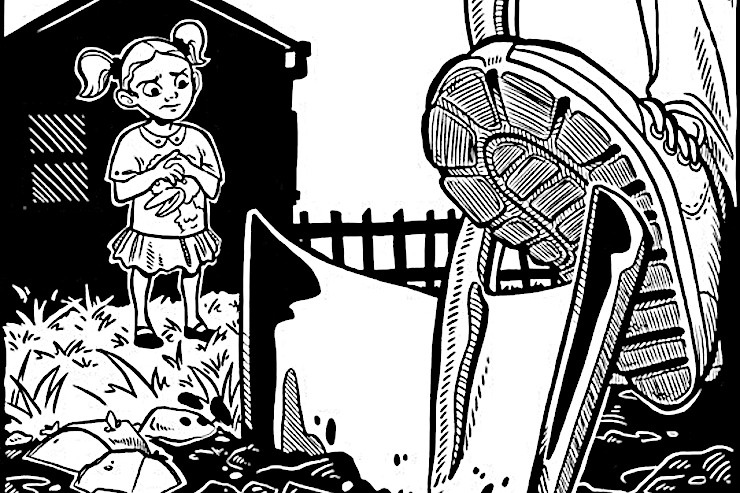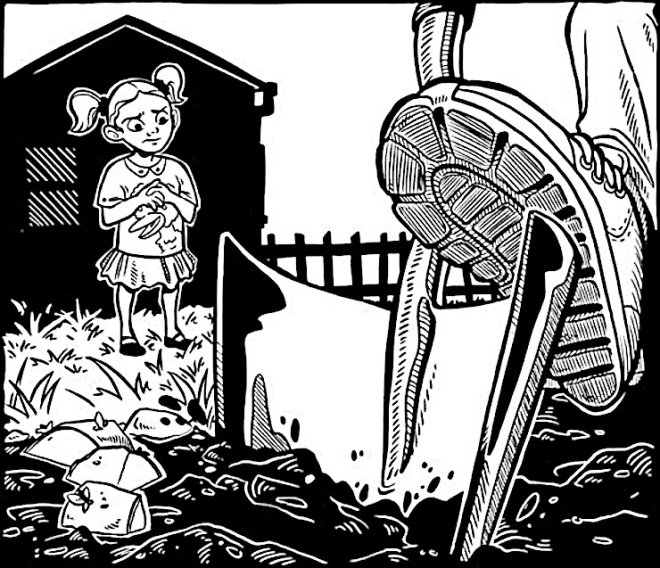
I consider myself lucky in a lot of ways. One of the biggest ones, for me, is knowing that my daughter is growing up with a family home garden. Since before she could walk, we’ve spent time in the garden together. She knows about planting seeds, waiting for those seeds to germinate, pulling weeds, and the joy of watching your little seedlings grow into plants. She knows the magic of pulling carrots out of the ground and tomatoes off the vine.
It’s hard for me to imagine not having a family home garden. Many people don’t have this experience, for any number of reasons. In today’s story, Crazy Woman Potatoes, Marcie Rendon introduces us to several generations of her family, many of whom grew up gardening. But when Marcie moves to the city, it becomes impossible for her to continue the gardening tradition. At least for a while.
Like many children today, Marcie’s kids became accustomed to the idea that food comes from the grocery store. To them, food came from cans and packages. Eventually, though, they moved to their own space where Marcie started her own family home garden. Things went along swimmingly. Or so she thought.
Unbeknownst to Marcie, her kids were very worried about her and her ideas of gardening. When you find out why, you’ll understand their concern! And you’ll get a good laugh. I hope you enjoy this story as much as I did!
Enjoy More Stories About Family Home Garden Mishaps, Misunderstandings, and Laughter
This story comes from our archive that spans over 30 years and includes more than 130 magazine issues of GreenPrints. I love pieces like these that turn stories into comical moments of laughter, and I hope you enjoy this story as well.

Crazy Woman Potatoes
Had Mom lost her mind?
By Marcie Rendon
One of my earliest memories is my father using a pitchfork to remove straw that had been placed on the garden bed over Winter. He talked about new life and respecting all creatures. I was barely 3 years old.
We lived on a dirt-poor farm which was mostly riverbank. Our house had neither electricity nor running water. My father worked as a farm laborer, planting potatoes in the Spring and driving combine for local farmers during harvest season. My mother worked in the Red River Valley potato fields. This was long before potato farm work became industrialized.
About the time I was 4, the Rural Electric Cooperative Association strung wires to our small farmstead. At some point we got a television set, one of those old wooden consoles with rabbit ears. I remember my father listening to the Minnesota Twins games (for some reason we could see The Lone Ranger but not the baseball game).
While he listened to the game, sometimes my dad would make homemade potato chips. He would slice the potatoes very thin and put them on a buttered cookie sheet in the woodstove oven. Those potatoes, which I had watched being planted, weeded, and picked, were some of the best food I’ve ever eaten.
I grew up and, as often happens with many rural children, after graduating high school moved to the city. I found work to support myself and my small family of three daughters. They rode their Hot Wheels around the block or played on swing sets at the local parks. They had a television set to watch Saturday morning cartoons and Sesame Street. They pestered me for quarters for the ice cream truck and we shopped at the local grocery store. Food came in cans. It came in packages that were opened and the food then cooked. They were city girls. I was a homesick country girl.

When they were in middle school, I had enough financial stability to buy my own home, with my own yard. After painting each bedroom a color of the girls’ choosing, I set to work digging up a large portion of the backyard. I was back to my rural roots, putting in carrots, broccoli, lettuce, and of course radishes.
When everything was planted except the potatoes, I went into the house and cut up potatoes, making sure that each chunk had an eye in it. As I was cutting them up, my daughter Simone, who was about 10, walked in. “Are we having potatoes for supper?”
“No, I’m going to plant these in the garden.”
When I had a bowl full of cut-up potatoes, she followed me outside. I could tell by the look on her face that she was curious about what I was doing. Quietly, she watched me drop each chunk of potato into the dirt. I covered them with dirt and proudly proclaimed, “There. Now we will have potatoes in the Fall.”
She said, “OK…” and then went back to whatever she had been doing. Over the Summer I tended and weeded the garden. We ate beans, peas, and carrots as they came in. I don’t remember anyone helping me harvest the food. I think they were so used to grocery shopping that they assumed that any food that appeared on the table came from the store.
Early that Fall I announced to no one in particular, “I think it’s time to dig up the potatoes.” Simone jumped up from her spot in front of the TV and followed me out to the back yard. She watched me intently as I dug up potato after potato. My small bowl of cut potatoes planted in the Spring was close to 20 pounds of red potatoes in the Fall. That night I scrubbed some clean and we had fresh-dug potatoes for dinner. They were delicious.
Years later, when Simone was a young adult, she said, “Mom, do you remember when you planted potatoes that first year in our new house on 17th Avenue?”
“Yes.”
“I thought you had gone crazy.”
“What?”
“One time on Sesame Street, Bert or Ernie planted canned beans in the ground and the plant grew canned beans. I knew that really didn’t happen. Canned food didn’t grow out of the ground. It came from the store. I thought you thought if you planted potatoes in the ground they would grow out of the ground like on that Sesame Street show. It wasn’t until you dug all those potatoes up that I realized you weren’t crazy.”
“You thought I was crazy? Why didn’t you say something?”
“Well, I really thought you had maybe lost your mind and I didn’t want to hurt your feelings.”
Today, Simone is the one of my daughters who is also an avid gardener. She’s the one who knows how to plant, harvest and save food for each season. And she knows very well that the best-tasting food doesn’t come from the store—but straight from the ground. ❖
By Marcie Rendon, published originally in 2021, in GreenPrints Issue #125. Illustrated by Hannah England

Do you have any family home garden stories like this that led to hilarity at some point later?




Love your family story and can relate to those potatoes with eyes. When a very young child, my earliest gardening memories are of my sister and I sharing a little space in our family garden planting seeds, watering and anxiously watching them grow.
Love love this as an avid gardener